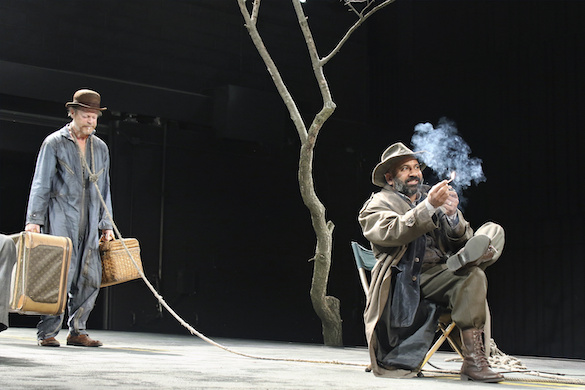As ‘Waiting for Godot’ Is Revived, Torches Are Passed to Paul Sparks and Michael Shannon
Following in the footsteps of many acting luminaries, the veteran troupers are being directed by Arin Arbus at Brooklyn’s Theatre for a New Audience. Both serve the bleak beauty and mordant humor of the language and ideas presented here.

There are certain roles that draw famous and esteemed actors to the stage like flies to honey, and “Waiting For Godot” has a pair of them. Samuel Beckett’s existentially stumped tramps, Vladimir and Estragon, have, over the past several decades, been played in New York productions by Steve Martin and the late Robin Williams, Bill Irwin and Nathan Lane, and Patrick Stewart and Ian McKellen, to cite a few luminaries.
Now the torches have been passed to Paul Sparks and Michael Shannon, also veteran troupers who have previously appeared together in numerous screen projects, including the series “Boardwalk Empire” and films by Mr. Shannon’s frequent collaborator, Jeff Nichols. For “Godot,” now being revived at Brooklyn’s Theatre for a New Audience, their director is Arin Arbus, whose many credits at the company range from classics by Shakespeare and others to contemporary works; she previously guided Mr. Shannon in Denis Johnson’s “Des Moines” and, on Broadway, in “Frankie and Johnny at the Clair du Lune.”
As a fellow movie star, Jessica Chastain, did in last season’s Broadway revival of “A Doll’s House,” Mr. Shannon appears onstage for audiences to ogle before the action begins. His Estragon — or Gogo, as he’s called by Vladimir, whom he refers to as Didi — lingers silently on the side of Riccardo Hernández’s stark, vast set, a two-way road going absolutely nowhere.
When Mr. Shannon finally utters the play’s famous first line, “Nothing to be done,” there is a slightly bemused quality to his resignation. Many have played Estragon as a sad clown, and this actor certainly captures his haplessness and helplessness, but there’s also a distinct, alluring dryness here; as he has done so often on stage and screen, Mr. Shannon invites us to scrutinize his character for a sense of inner dialogue — however simple or stunted that exchange may be in this case.

Mr. Sparks, in contrast, roars on like a steam engine, sporting a grizzled beard that makes him look a good two decades older than he did in his last theater gig, earlier this year in Broadway’s “Grey House.” His Vladimir is manic and, frankly, a bit mannered — literally down to his fingers, which seem to twitch and twirl throughout the performance.
It’s an interesting choice on the two actors’ part, and Ms. Arbus’s, to have the more intellectually active of these characters appear, on the surface, more buffoonish. But scenery-chewing is always a danger with both these roles, and there are times when Mr. Sparks comes perilously close to indulging.
To their credit, both actors serve the bleak beauty and mordant humor of the language and ideas presented here, sustaining our interest through two and a half hours of essential stasis. They get vigorous, witty support from Ajay Naidu and Jeff Biehl as, respectively, the tyrannical visitor Pozzo and his ironically named servant, Lucky.
Young Toussaint Francois Battiste completes the company charmingly as the boy who appears at the end of both acts, reassuring Vladimir and Estragon that their patience will pay off. It won’t, of course, but at least yours won’t be tested by this imperfect but intriguing production.

